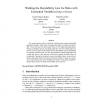Free Online Productivity Tools
i2Speak
i2Symbol
i2OCR
iTex2Img
iWeb2Print
iWeb2Shot
i2Type
iPdf2Split
iPdf2Merge
i2Bopomofo
i2Arabic
i2Style
i2Image
i2PDF
iLatex2Rtf
Sci2ools
97
Voted
KR
2010
Springer
2010
Springer
Walking the Decidability Line for Rules with Existential Variables
We consider positive rules in which the conclusion may contain existentially quantified variables, which makes reasoning tasks (such as Deduction) undecidable. These rules have the same logical form as TGD (tuple-generating dependencies) in databases and as conceptual graph rules. The aim of this paper is to provide a clearer picture of the frontier between decidability and non-decidability of reasoning with these rules. We show that Deduction remains undecidable with rule; then we show that none of the known abstract decidable classes is recognizable. Turning our attention to concrete decidable classes, we provide new classes and classify all known classes by inclusion. Finally, we study, in a systematic way, the question “given two decidable sets of rules, is their union decidable?”, and provide an answer for all known decidable cases except one. Research Report LIRMM 09030 (December 2009)
Abstract Decidable Classes | Automated Reasoning | Conceptual Graph Rules | Decidable Classes | KR 2010 |
| Added | 19 Jul 2010 |
| Updated | 19 Jul 2010 |
| Type | Conference |
| Year | 2010 |
| Where | KR |
| Authors | Jean-François Baget, Michel LeClere, Marie-Laure Mugnier |
Comments (0)

